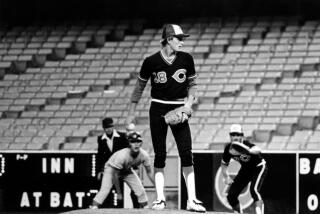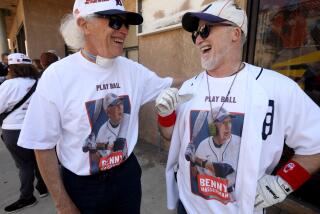Like Father, Like Son : Dave Blackburn Followed His Dad Into the Family Business--Pitching
Dave Blackburn’s father, Ernie, used to swing the family station wagon into his Calumet City, Ill., driveway. The doors and tailgate would creak open and his wife and four sons would pile out after pecks on the cheek all around.
Ernie, already late for work--the rumble of the train and blare of its horn several miles back had told him that--would slip the station wagon into reverse, then back into drive and lurch toward the train station.
Ernie Blackburn, one of the finest fast-pitch softball pitchers in the Midwest, would soon take his place behind the controls of the town’s locomotive, which he has engineered since the 1950s.
Many times, Ernie would report to work wearing his cotton softball uniform, still streaked with the dust and lime of another barnstorming tour.
Twenty years later, Ernie’s son Dave is doing the barnstorming but in a polyester uniform and to places like Tel Aviv, Israel, and Caracas, Venezuela. Dave, 28, a University of Illinois graduate and industrial engineer in Oxnard, has become one of the finest windmillers in Southern California.
“My childhood in the summer was spent with my family, traveling with my dad going to the major tournaments and games,” Blackburn said. “We would drive around the Chicago area and all of the Midwest, so I was exposed to it. I got into it at an early age and liked it and had a desire to be good at it.
“From the time I could crawl, as far back as I can remember, I remember piling in the car and going to ballgames. That was part of life.”
In 1982, Blackburn was recruited out of college to play for the Camarillo Kings, who had won the International Softball Congress championship the season before. The Kings repeated the next season, with Blackburn doing much of the pitching.
“It was an opportunity to come in with guys who were at the top of their games and learn from them,” he said.
The Kings, however, disbanded and Blackburn joined the Lakewood Brewers, an A League team in the Western Softball Congress.
In 1985, Blackburn was chosen to represent the United States in the 12th Maccabiah Games, an event for Jewish athletes. In the tournament’s closing stages, Blackburn twice defeated a team from Canada, picking up a 3-0 victory in the gold medal game.
The majority of Blackburn’s teammates from that team will reunite Saturday in Caracas in a celebration of the 20th anniversary of Venezuela’s first Jewish community center.
The tournament is a six-team round-robin affair. Many of the teams that competed in the last Maccabiah Games, including silver-medalist Canada, will participate.
“I’m really looking forward to seeing the guys we played against in ’85 and getting an opportunity to play against them again,” Blackburn said. “We’re especially looking forward to playing Canada, who we took the gold medal from on that last day. And I’m sure they want to play us.”
Blackburn plays for these select teams because he throws hard; he says his fastball reaches 90 m.p.h.
And, at 6 foot, 3 inches, 250 pounds, his curves and changeups are that much more difficult to gauge. “To be a successful pitcher, you have to be able to throw a riseball, a drop and a changeup at bare minimum,” Blackburn said. “You have to have those three pitches at your disposal at any time. And it’s imperative that you make the ball break when it’s supposed to break--just like a major league pitcher.
“But when you make a mistake . . . you get torched. Just like the guy who’s standing out on the rubber at Anaheim Stadium.”
And Anaheim Stadium, like Caracas and Tel Aviv, is a long way from Calumet City, where fast-pitch softball is serious and the train is sometimes a little late.
More to Read
Go beyond the scoreboard
Get the latest on L.A.'s teams in the daily Sports Report newsletter.
You may occasionally receive promotional content from the Los Angeles Times.










